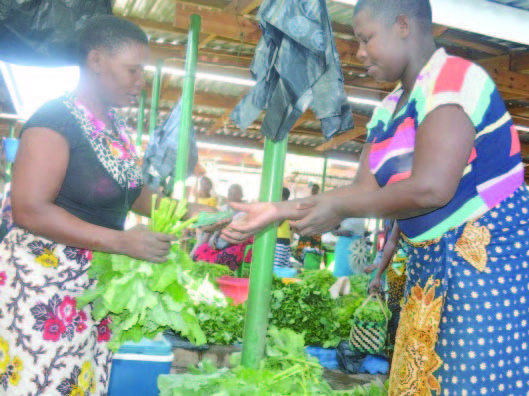New market boosts vendors’ income
Frank Jafali attributes an improved life of his family to the construction of new Lunzu Market in Blantyre.
The 45-year-old, who sells cabbage and other vegetables, says the new infrastructure has boosted his sales.

“I easily provide for my family now because I am selling more. The new market has made it easy for customers to find us. There is improved sanitation and hygiene, and more people are coming,” says Jafali of Yoyola Village in Traditional Authority (T/A) Kapeni in the district.
Another vendor, Olive Mulera, 35, says now they have more time for doing business.
“Before this development, we used to have our goods on the dirty ground and few customers bought from us. The leaky makeshift sheds could not allow us to do business during the rainy season,” she says.
The mother of four from Chigumula Village in T/A Kapeni, says they were forced to carry goods home every day as there was no proper store rooms.
Now the two and other 1 200 vendors at the market are registering success in their endeavours. They have more customers. They also have peace of mind in terms of security.
The vendors attribute the new lease of life to the erection of Lunzu Market. The infrastructure has among other advanced structures such as sheds in all sections, dump site, shops, slaughterhouse and pit latrines.
National Local Government Finance Committee (NLGFC) constructed the market under More Income and Employment in Rural Areas (Miera) Project with financial support from German Government through KfW.
The project was meant to improve economic infrastructure to provide a conducive business environment for small-scale business owners and smallholder farmers.
Lunzu Market chairperson Henderson Ligomeka agrees with Jafali and Mulera on improved economic activities that have brought positive strides in their lives.
“The market has every section needed for us to thrive. It is easy for customers to find what they want here,” he says.
Though it is beautiful and spacious, Ligomeka has asked for market expansion as others still operate on dirty grounds.
“We have more land that can be developed to expand the market so that all of us are accommodated in the improved structures,” he says.
The market’s revenue collector Thom Simbota says the project has made it easy for him to do his job.
“People were refusing to pay market fees as the environment was frustrating their efforts to thrive. Since the market was opened, the collection has risen to K140 000 and K190 000 on regular days and market days, respectively,” he explains.
Apart from getting his salary on time, Simbota says the development also allows them to meet market needs of vendors easily and on time.
Blantyre District Council chief accountant Paul Kuvulo says they depend on the market to raise revenue for operations. “It is our big market. The project has just stimulated it to give us more revenue. Now we get K2 million per month from K1.4 million,” he says.





